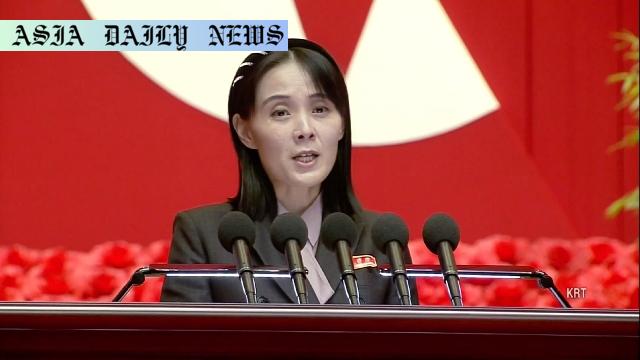North Korea rejected South Korea’s call for dialogue, with Kim Yo Jong criticizing the efforts as unworthy and purely reversible.
- North Korea dismisses South Korea’s call for dialogue through a strong statement by Kim Yo Jong.
- Kim criticizes South Korea’s conciliatory approach and joint military exercises with the U.S.
- Suspension of loudspeaker broadcasts seen as unworthy of appreciation or progress.

North Korea’s Strong Rejection of Dialogue Offer
On Monday, North Korea, through Kim Yo Jong, the sister of its leader Kim Jong Un, sent a strong response rejecting the South Korean government’s call for dialogue under the leadership of President Lee Jae-myung. South Korea has taken a softer, conciliatory approach towards its neighbor since Lee assumed office in June. This included the suspension of loudspeaker broadcasts that had long been a tool of psychological warfare against North Korea. However, Kim Yo Jong dismissed these reconciliatory steps as ‘reversible’ and undeserving of appreciation.
Kim insisted in her statement, broadcasted via state-run media, that North Korea has neither a reason to meet nor issues to discuss with the South. This stance underscores Pyongyang’s disinterest in improving inter-Korean relations despite South Korea’s visible effort to de-escalate tensions. It also serves as North Korea’s first official response to South Korea’s initiatives, signaling a widening chasm between the two countries.
Tense Dynamics Amidst US-South Korea Military Exercises
Another major point of contention highlighted by Kim Yo Jong was South Korea’s strong reliance on its alliance with the United States. Terming it as ‘blind trust,’ she criticized the joint US-South Korea military exercises scheduled for next month, labeling them as actions that reinforce confrontation. According to Kim, such exercises leave no room for change in North Korea’s view of its rivals, further solidifying its stance of animosity and suspicion towards both nations.
The rhetoric clearly indicates Pyongyang’s continued focus on its strategic defense and commitment to its hostile view towards Seoul and Washington. This serves as a reminder that efforts at reconciliation, without substantial changes in military cooperation dynamics, might not yield meaningful breakthroughs in relations.
Implications for Inter-Korean Relations
Kim Yo Jong’s firm rhetoric and rejection of dialogue spell challenging times ahead for South Korea’s efforts to mend ties with its northern neighbor. The Lee administration’s suspension of the loudspeaker broadcasts, a symbolic step for goodwill, has been trivialized by North Korea, eroding the minimal progress attained. Kim’s reference to these initiatives as merely undoing past mistakes suggests that any progress will be met with skepticism and pushback.
This development could also strain South Korea’s domestic policies, as the administration will face both domestic and international pressures in its bid to maintain stability, seek peace, and avoid military escalation. Meanwhile, Pyongyang’s unwavering stance demands international attention, as it remains a focal point of geopolitical uncertainties within Asia.



Commentary
Interpreting North Korea’s Resentment
The outright rejection by Kim Yo Jong of South Korea’s olive branch sends a clear and discouraging message about the future trajectory of inter-Korean relations. To many, it reflects North Korea’s enduring focus on maintaining its autonomy and resisting external influence, even when the intentions are explicitly peaceful or conciliatory. The blistering response undermines the goodwill extended by the South, dashing hopes for constructive dialogue in the near future.
It’s worth delving deeper into the reasons behind such a defiant stance. From Pyongyang’s perspective, South Korea’s ongoing military cooperation with the United States likely serves as a deterrent against any trust in bilateral intentions. This conflict of interest highlights the multidimensional complexity of fostering peace in the Korean Peninsula, where every step towards reconciliation is accompanied by conflicting strategic maneuvers.
What Does This Mean Going Forward?
Kim’s labeling of South Korea’s trust in the US as ‘blind trust’ exposes a persistent sore point in inter-Korean ties. It underscores a systemic incapability of the two Koreas to reconcile the geopolitical and military realities that define their respective relationships with major global powers. This rejection could force Seoul to reassess the balance it maintains between its alliance commitments and regional peace ambitions.
On the brighter side, the South’s conciliatory tone could still pave the way for a gradual thaw in relations, should circumstances shift. Yet, this possibility remains contingent on whether both nations and their allies are willing to make concessions and recalibrate their priorities. For now, North Korea’s rejection reiterates a sobering fact: sustainable peace in the region demands time, trust, and a significant reshaping of current narratives.